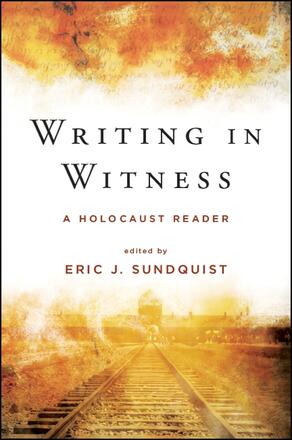
Writing in Witness
A Holocaust Reader
Alternative formats available from:
A comprehensive survey of the most important writing to come out of the Holocaust.
Description
Finalist for the 2019 National Jewish Book Award in the Anthologies and Collections Category presented by the Jewish Book Council
Silver Winner for Anthologies, 2018 Foreword INDIES Book of the Year Awards
Writing in Witness is a broad survey of the most important writing about the Holocaust produced by eyewitnesses at the time and soon after. Whether they intended to spark resistance and undermine Nazi authority, to comfort family and community, to beseech God, or to leave a memorial record for posterity, the writers reflect on the power and limitations of the written word in the face of events often thought to be beyond representation. The diaries, journals, letters, poems, and other works were created across a geography reaching from the Baltics to the Balkans, from the Atlantic coast to the heart of the Soviet Union, and in a wide array of original languages. Along with the readings, Eric J. Sundquist's introductions provide a comprehensive account of the Holocaust as a historical event. Including works by prominent authors such as Primo Levi and Elie Wiesel, as well those little known or anonymous, Writing in Witness provides, in vital and memorable examples, a wide-ranging account of the Holocaust by those who felt the imperative to give written testimony.
Eric J. Sundquist is Andrew W. Mellon Professor Emeritus of the Humanities at Johns Hopkins University, and the editor of many books, including (with David Cesarani) After the Holocaust: Challenging the Myth of Silence.
Reviews
"Written in every European language, in every conceivable manner, and from every point on the Holocaust compass—prisons, ghettos, transports, concentration and labor camps, killing fields, bunkers and makeshift shelters, camps for displaced persons—these diary entries, letters, testimonies, eyewitness accounts, poems, stories, sermons and inscriptions demand that they be heard. Written by Jewish men, women, and children; by Christian bystanders and yes, even by two German perpetrators, they depict the living nightmare as it unfolds. Six nightmare years and their aftermath are rendered in a language that defies the limits of language; an inescapable present that eclipses the past and cries out to an unattainable future. In the beginning was the Holocaust, and this is its story as told by its original responders." — David G. Roskies, author of Holocaust Literature: A History and Guide
"Writing in Witness is a devastatingly and deeply honest work of testimony by those whose worlds were shattered by the catastrophic rupture of the Holocaust. It is also, and primarily, a testament to the strength and courage of those who experienced the atrocities of Nazism and who felt compelled to write about those events in clear, unsparing language. Eric Sundquist, editor of this important collection, provides a sensitive selection of primary texts by men and women who witnessed the machinery and implementation of genocide. In his thoughtful and knowledgeable introduction, Sundquist establishes the framework for the ethical engagement of reader and eyewitness in the calculation of enormous loss. The various genres of witnessing included in this collection—diaries, poems, memoirs, letters, records—evoke in their clarity ancient forms of lamentation and Midrash, giving voice to memory. With judiciously interpretive preliminary material introducing each section, Sundquist lets the witnesses speak for themselves. No course on Holocaust literature or history should be without this anthology." — Victoria Aarons, editor of Third-Generation Holocaust Narratives: Memory in Memoir and Fiction
"This wide-ranging and affecting collection of first-hand accounts of the Holocaust, each expertly chosen and deftly introduced and contextualized, will be ideal for teaching purposes and indispensable to anyone intent on recovering a sense of what the horror felt like. Eric Sundquist has assembled an extraordinarily illuminating and powerful book." — Peter Hayes, Theodore Zev Weiss Holocaust Educational Foundation Professor Emeritus, Northwestern University
"Writing in Witness is a rich assortment of written accounts of diverse aspects of the experience of the Holocaust that are skillfully chosen and masterfully introduced and contextualized. What emerges from an overarching reading of these collective texts is a sense of how the actors who experienced or witnessed the events of the Holocaust registered them in language and through the sometimes immediate, sometimes reflective process of writing." — Erin McGlothlin, author of Second-Generation Holocaust Literature: Legacies of Survival and Perpetration